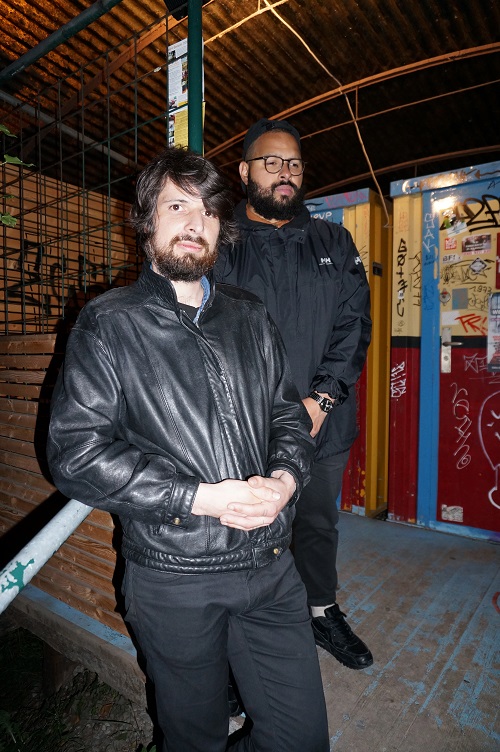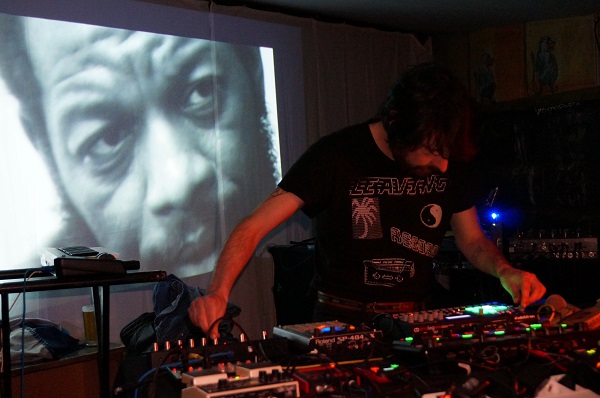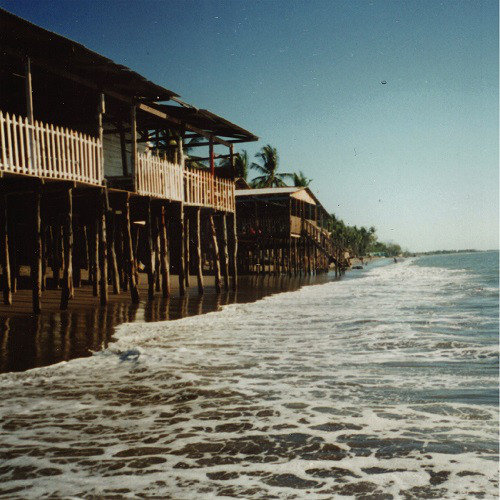Remo Bitzi: Let’s start with how you guys met! Did you go to school together?
Philippe Hallais: We met on this thing called the Internet, actually [laughs]. Jean [Carval], the guy I am running Editions Gravats with and a really good friend of mine, has been a big fan of High Wolf since the beginning. He was telling me about Max’s music ever since. When the Black Zone Myth Chant cassette came out, Jean was like, “Dude, you have to listen to that!”. I did and I realized that this is a complete different story than High Wolf, which I already liked a lot. That was in…[addressing MP]…when did it come out?
Max Primault: 2011.
PH: 2011, right. I was living in Nantes at that time. And I was always DJing a few tracks of this cassette back then.
RB: You were DJing with cassettes?
PH: No, I bought the files on Bandcamp as well. So I was playing that all the time. And a lot of people were asking me about it—at that time Black Zone was a really underground project. Especially in my scene, no one had a clue about it. What I liked about it was that it’s electronic music but it sounded like the guy who produced it didn’t know very much about this kind of music. I thought it was funny to imagine how it was produced and that it was not intended to be played in a club. I also imagined that the producer had no idea that some DJ is playing his stuff.
MP: I had no idea.
PH: So when Jean and I started talking about launching a label, for us the obvious thing was to contact this guy called Black Zone Myth Chant. That’s it—I contacted Max. I had his email through a mutual friend.
MP: Who?
PH: The guy who booked you in Nantes at this festival. So I was contacting Max, saying, “I’m this guy and I’m a big fan of Black Zone Myth Chant. What’s going on with the project? Was it a one-off thing? Do you have other stuff coming out?” At that time we had no idea about the label—no name, no release schedule, nothing. We just had this idea. I had no details about anything. Max responded very quickly. Then we started chatting. Later we met. The funny thing is that Max is living in a city where I used to study and also where my girlfriend’s family is based: Rennes. So I was often there. On top of that, Jean, the guy running Gravats with me, also lives in Rennes.
MP: But we didn’t know about that at all.
PH: To be honest, I knew Black Zone was French because this mutual friend told me. But the first time I listened to his music I thought he was American. I think the same goes for High Wolf.
MP: Even today, I get emails from people in Europe asking: “Are you gonna be in Europe at some point?” That happens a lot.
PH: That was another thing: we wanted to have a label that works with local artists. When I learned that he’s French, I knew we definitely had to work with him.
RB: How was that for you, Max, for a techno/house DJ to approach you?
MP: To be honest, I didn’t know who he was at the time. I mean, there are a lot of things I don’t know [laughs]. So I got this email and there were some links. I checked them out and I really liked the material. At that time, I wasn’t sure if there would be another Black Zone release, though. It took a long time after the initial contact for the release to come out…
PH: A year and a half. We were chatting, getting to know each other…
MP: Doing another Black Zone release sounded interesting to me. At the same time, I didn’t want to make the same thing again. So I had to think about what I wanted to do with this situation. Therefore, I didn’t agree to do the release straight away. At the same time, I really wanted to do it… [pauses]. My roots are in a more experimental scene. And you know, the techno scene is different. There is sort of a distrust in my scene towards the techno guys. Maybe—not in my case, but in general—that’s because of jealousy. Like: “Oh, look at those techno guys playing in front of 600 people. They’re successful and we play in front of none.” And maybe it’s the same the other way around. Maybe the techno guys are a bit jealous of the underground vibes that are going on in our scene. So I think it’s a very good thing that Phil broke that barrier down and got in touch with me. In France there are a lot of different scenes. It’s not even about the music— it’s just because you are in a group that’s not talking to another group—there’s no exchange…
PH: That was actually another motivation behind starting a label. There was this frustration because there is so much good music in France right now, and the people making that music don’t really talk to each other. It’s really a shame. So Jean and I always had this conversation: “there is this guy who’s so sick and nobody knows…” That’s what was going on in Paris [pauses]. Now it’s changing. It’s definitely changing a lot.
RB: You have any idea why?
PH: I don’t know. I guess there have been a few labels…And maybe that caused some sort of domino effect.
MP: I think it’s because of techno labels like L.I.E.S. or In Paradisum that introduced this kind of different sound that prepared the ears of the techno-heads to get into a more experimental domain; weird leftfield stuff. Personally, I like this music because it’s something else—a mix of techno with some other influences. For example, Phil’s record on L.I.E.S. [Garifuna Variations, 2014, see picture] is not techno music per se. I guess people got interested in both sides. They started digging techno but also the other side.
RB: So you don’t have any background in techno?
MP: Definitely not. But I listened to a lot of electronic music when I was in high school. The obvious stuff: Warp and Ninja Tunes. The closest thing to techno I listened to was Aphex Twin and Autechre. That was my limit.
PH: [Addressing MP] The straightforward four-to-the-floor thing wasn’t of interest to you?
MP: No, I never listened to that. It needed to be weird enough [laughs]. I think there are some really weird techno records, but you had to be kind of a specialist to get access to those. And it was a genre I didn’t really investigate when I was younger. I don’t know, the labels I was talking about before—not everything they release is my taste, but then there is stuff I really like. It’s excellent music that I enjoy a lot. These days I probably know a little bit more about it because it’s all over the place. The information is available. Also through Phil I picked up some names.
PH: I remember one of the first conversations we had was about music. I asked Max: “So you don’t know anything about techno?” And he was like: “No”. But then the next minute he told me that there were two projects he really liked: Jahiliyya Fields, who’s released music on L.I.E.S. [e.g. Pleasure Sentence in 2013], and Hieroglyphic Being [see zweikommasieben #11].
RB: So there was some common ground.
PH: Yeah, I thought that we could go from there.
RB: You’ve played some shows together already, right?
PH: Yes, we did a tour last month. We were on the road for almost three weeks—we did a bit of France, a bit of Belgium, the Netherlands and Germany. It was about ten gigs.
RB: How was the reaction from the audience?
PH: It was cool. [Pauses] For Max that was the occasion to adapt the Black Zone project into a live environment. [Addressing MP] That was the first time, right?
MP: Yeah, I created the live show for this tour.
PH: For me it was a good occasion to try something new, because I don’t play live that often. I DJ most of the time…
RB: What kind of venues did you play?
PH: There were a couple of club gigs, but mostly we played art spaces or squat-ish concert places with a…
MP: …DIY-vibe.
PH: Because of that I was doing some sort of improvisation. So for both of us it was a challenge.
RB: Although you have different backgrounds, your music shares some commonalities: there is this ritualistic aspect, for example. Let’s talk about that! Have you taken part in any interesting practices related to that?
PH: Personally I haven’t. I definitely love the state of trance and I’m playing with it, trying to adapt it to a different context, a techno context. But I wouldn’t say it’s a statement, really. Most of the time it’s not even made on purpose. It’s just the way it is, cause I like my thing to have percussion. I like repetitive stuff, loops. It’s not really overthought. Usually I approach music in a very naïve way. I mean if I want to do an electro flunk record tomorrow or a dub record or a dancehall record, I just do it. In the end I just try to have fun…the first time you listen to Enter the Wu-Tang (36 Chambers), you’re like: “This is dope”. And for me it’s the same thing with percussive music; like when I listened to traditional African music—very trance-y stuff—for the first time, I was like, “ok, I really can relate to that”. But as I said, it’s totally not overthought.
RB: And what about you, Max? I’m thinking of this 7” with a man looking like some sort of guru on the cover [High Wolf’s A Guide To Healing that was released through Bathetic Records in 2011]…
MP: I think most of the things Phil said I can agree with. I really like ritual music—that’s a fact. And when you say our projects have some similarities, I would agree too—I’m realizing that more and more. When I see him play live, doing his stuff, I’m like,“that’s right up my alley”. But I for myself do have an interest in rituals from different times and places. I’m reading books about that stuff—just recently I read this ethnological study about Haitian Voodoo. Those rituals are so tight. There’s a million details. It’s crazy. To me that’s more creative and mind-blowing than art. It’s hard to explain, but I think that’s a very interesting side of the human being: people have this strange relationship with the afterlife, the spiritual world and all that. And they sometimes do some crazy shit.
RB: Right. Have you ever attended a crazy ritual like that yourself?
MP: I’ve seen a few things; in Asia mostly. There was a ceremony in Indonesia, where they buried people… [PH turns around, looking shocked] Dead people obviously, bodies! [Laughs]
PH: I was already wondering, dude…
MP: Well, they bury dead people for five years and then they take the bodies out and burn them on the beach. It’s a three-day ceremony with music and huge fires—crazy stuff. I’ve also seen some cremation ceremonies in India that were stunning. If I were to see a dead body in a Western context, I’d freak out, cause I’m not comfortable with it. But there it’s different… It’s a matter of context, I reckon. But yeah, I’ve never really participated in a ritual, but I witnessed some things from a distance.
RB: You’ve mentioned music that accompanies rituals. In Europe there are rituals related to death and there’s also music that’s played, but it seems totally discharged. The energy seems to be somewhere else. I’m thinking of venues for music…
MP: Music has been a part of rituals forever. So it’s the question of which came first, the chicken or the egg. But on a very rational level, it’s a weird thing that people would get together in a room to listen to sounds that are very weirdly combined. Why would they do that? Why make records? Why would anybody listen to sounds? It doesn’t give you anything. But that’s the issue with art in general… Probably it’s just— not a modern ritual, but there probably are a few hidden things, like sharing something with other people. Probably there is some relation to transcendence, to go beyond something you can understand, go beyond language and so on. I don’t know. [Addressing PH] What do you think about all that?
PH: The phenomenon of artists being interested in foreign cultures, and rituals in particular, definitely is not new. Surrealist and cubist artists, for example, were fascinated by traditional African masks employed in rituals. Also, people doing experimental music, especially industrial music, were influenced by ancient cultures from Africa and Asia. It’s been around for so many years. Esplendor Geométrico, for example— they have been around for 30 years, and they were definitely into rituals.
RB: Is that an interest for you, industrial music? I read in an interview that you were not familiar with this kind of music.
PH: I’m familiar with industrial music. It’s more noise and power electronics that I don’t have a clue about. And I don’t think I want to know more about that.
RB: Why not?
PH: I really like this state of having a naïve access to that kind of music. I just like to think of the idea of what a noise or power electronics record should sound like. It’s more imaginative. But I’m not at all familiar with it; I know maybe three or four records. Industrial is different. It’s something that I really got deep into. The first time I listened to Throbbing Gristle or Chris and Cosey I was blown away. And those guys were actually obsessed with rituals too. That, by the way, is why I don’t want to make it too much of a statement. I think a lot of artists were obsessed with that stuff at a certain point.
RB: And for you, Max? Is industrial music of interest to you?
MP: I can’t say that I know too much about it; just a few things. Phil was mentioning Esplendor Geométrico before—he made a mix recently for Juno Plus using one of their tracks. And I had to ask him what it was because I wanted to check them out…
PH: I was mixing it with a Black Zone track.
MP: Besides that, I listened to Throbbing Gristle and stuff like that. If I remember correctly, back in the days I liked it a bit but wasn’t blown away, really. It wasn’t my cup of tea back then. I know a bit more about noise and power electronics, though. There are some Skullflower records I like a lot. Although I think it’s great music, I can’t listen to it for more than 15 minutes [laughs]. I think it’s too challenging.



